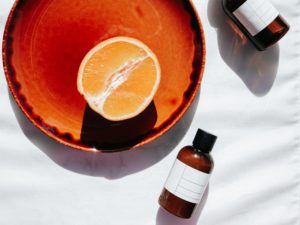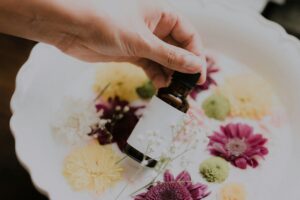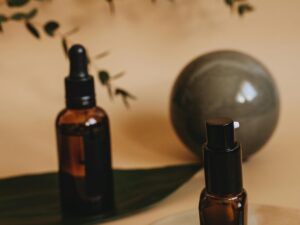A Complete Guide to Rosehip Oil – Everything You Need to Know
While facial oils may seem superfluous in a skincare routine, there can be many benefits to adding one. This is a complete guide to rosehip oil, one of the best facial oils for skin health and appearance.

Keep reading to find out everything you need to know about rosehip oil, including benefits, risks, dosages, and how to shop for the best product in order to boost skin health drastically. Plus, check out the quick tips at the end to find out how to safely start incorporating it into your daily skincare routine.
What are Facial Oils
Just as the name implies, facial oils are extracted in a way that makes them safe for facial use. Facial oils can have many benefits, though not all of them are created equally. It is very important to choose one that benefits your skin type and helps you address any particular skin concerns. Facial oils usually consist of pure oils that come directly from the source. Some examples include coconut oil, jojoba oil, argan oil, or tea tree oil. Facial oil formulations may contain a blend of oils or may be created with other skincare ingredients that can benefit skin health, such as retinol.
Some general benefits of skincare oils include having emollient or occlusive properties. This means that they can help keep the skin hydrated and improve moisturizing effects. While not a necessary step in a skincare routine, it can have many benefits, especially rose hip.
What is Rosehip Oil
Rosehip oil is an ingredient that is derived from the fruit and seed of a wild rose bush. This vegetation is mostly grown in the Andes mountains, parts of Europe, and Africa. This ingredient May date as far back as ancient Egypt, with records showing it may have been used to treat a variety of skin conditions. Rosehip oil has many benefits and can be beneficial for many skin types, including acne-prone and oily skin.
Benefits
There are many benefits to rosehip oil. It contains many vitamins such as vitamin C, vitamin F, and vitamin A, making it very beneficial to skin health. It also contains a lot of fatty acids, including oleic acid, linoleic acid, palmitic acid, and more.
The vitamin C in rosehip oil has antioxidant properties that can help reduce the damage caused by UV rays from the Sun and free radicals. Vitamin C is also very helpful in skin repair and preventing dryness of the skin. The vitamin A in rosehip oil can also help protect from UV radiation. This vitamin can increase skin health by reducing hyperpigmentation, wrinkles, and fine lines, and can even help treat acne.
Furthermore, rosehip oil has anti-inflammatory and antibacterial properties that can make it beneficial for treating acne and eczema.
What Skin Type Should Use Rosehip Oil
Due to its composition, many skin types can use rosehip oil. It is very nourishing and moisturizing, while also having properties that help maintain the balance of the skin. This makes it very good for people who have normal skin, dry skin, and oily skin. It can even be used by people with sensitive skin, but only a specific type.
How to Use
There are many ways to use rosehip oil in your skincare routine. Some moisturizers and serums are formulated with rose hip extract and can be easily incorporated. However, rosehip oil is very beneficial as a pure oil. This would make it one of the last steps in your skincare routine after you cleanse and moisturize. If you are looking for a pure form of rosehip oil, make sure it is cold-pressed and organic. This ensures that there are no added preservatives, fragrances, or chemicals. This organic cold-pressed rosehip oil is very beneficial for those with sensitive skin that needs an extra bit of moisture.
Dosage
There is no set recommended dosage for rosehip oil, as it can be found in many different forms, from moisturizers to pure oils. In general, it may be beneficial to apply twice a day along with your moisturizer. It can also be applied to different areas of your skin that need a bit more moisture, such as any dry spots, stretch marks, or scars.
Quick Tips for Skincare Oils
Here are some general quick tips for using skin care facial oils in your current routine.
- Patch Test – remember to always patch test any new skincare product or ingredient. A patch test is done by placing a bit of the skin care product on the body, either the inside of the wrist, the side of the neck, or the side of the thigh. Then, wait up to 48 hours to make sure that the area does not have any sort of irritation or allergic reaction. If all is well, then you can safely apply the product to your face.
- Add it Slowly – the skin may take a bit of time to get used to a new product. That is why it is important to start slow. Use facial oil maybe three times a week, and see how your skin reacts. Increase its use as needed. I apply facial oil twice a day with no negative reaction. Remember that everybody is different so see what works for you and listen to your skin.
- Watch Your Skin – remember to always watch your skin as it reacts to a new product. Check if your skin feels better or worse if it feels more moisturized or dryer. If you experience any sort of redness, irritation, inflammation, or sensitivity, stop using the product.
- Mix – if it feels a bit uncomfortable putting an oil on your face, try mixing it. One way to incorporate facial oil is to mix it with your moisturizer. This will increase the occlusive nature of your moisturizer, making it even better at keeping hydration in your skin.
The Takeaway
This complete guide to rosehip oil can help you incorporate it into your daily skin routine. Skin care is self-care and everyone needs to have a science-based skincare routine that can bring real benefits to your skin health. By supporting skin health we are supporting the health of our body. Rosehip is an incredible oil with many benefits that can be used by almost anyone, including individuals with oily or acne-prone skin. Even people with sensitive skin can find rosehip oil in its pure, cold-pressed form, and use it with no irritation. As always, patch test any new skincare ingredient before applying it to the face to avoid any irritation or potential allergic reaction.
Remember that health comes from within. Eat nutritious food, exercise when you can, and take care of your mental health. Daily habits become the building blocks for emotional, mental, and physical health. Take care of your gut health too! Learn everything you need to know about gut microbiota today for free here.





